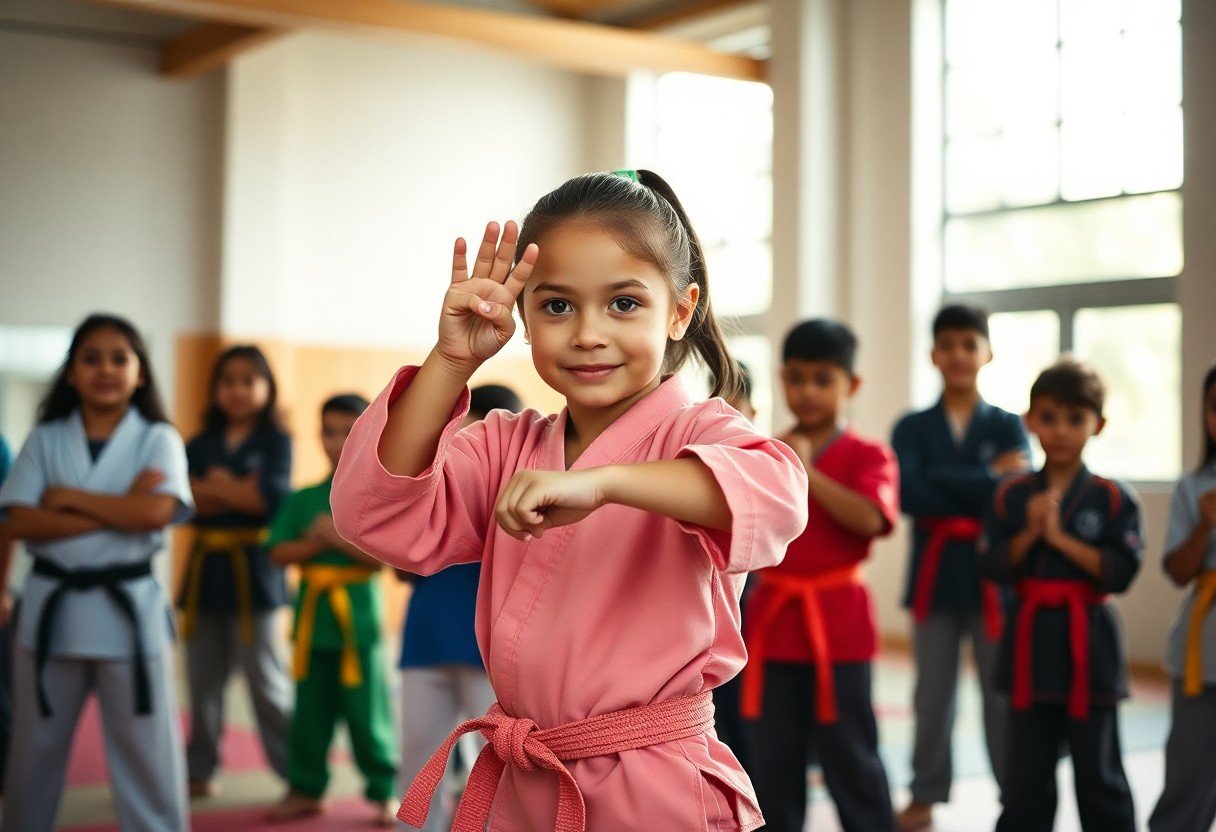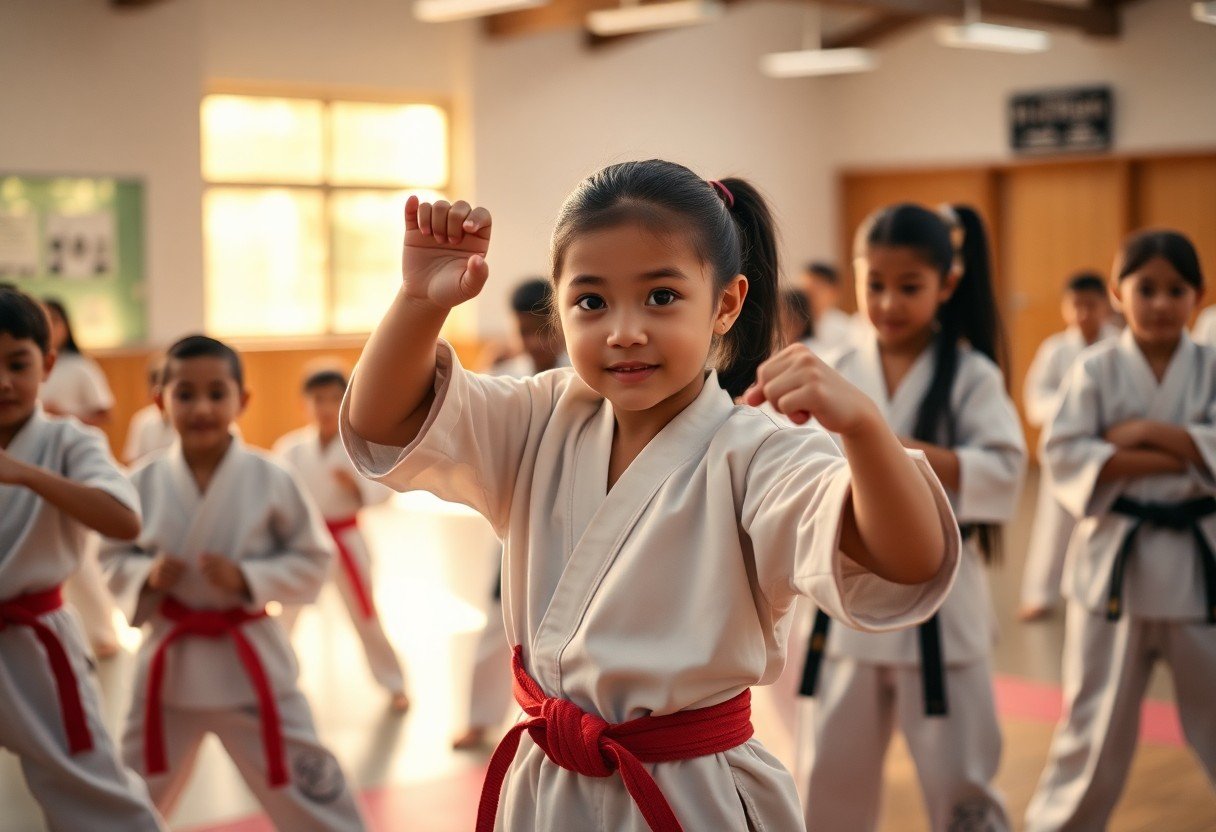Most parents seek effective ways to enhance their child’s confidence and self-esteem, and martial arts offers a powerful solution. Through structured training, your child learns discipline, respect, and perseverance, fostering a profound sense of achievement. The positive environment encourages them to face challenges head-on, significantly reducing feelings of anxiety and self-doubt. As they master new skills and earn belts, you will notice a visible shift in their behaviour and outlook, paving the way for effective communication and social interaction in other aspects of life.
Understanding Confidence and Self-Esteem
Before you initiate on your journey to enhance your child’s confidence, it is important to grasp the concepts of confidence and self-esteem. These traits are foundational to your child’s overall wellbeing and influence their interactions with the world. As a parent or guardian, understanding the interplay between these two aspects is vital for fostering a supportive environment in which your child can thrive.
Defining Confidence and Self-Esteem
Below are two terms often used interchangeably but represent different concepts. Confidence pertains to your child’s belief in their abilities to succeed in specific tasks or situations, while self-esteem reflects their overall sense of self-worth and value. Recognising this distinction can help you guide your child effectively towards the development of both qualities.
The Importance of Confidence for Children
By nurturing confidence in your child, you equip them with important tools to navigate life’s challenges. A confident child is more likely to engage in new activities, overcome obstacles, and develop resilient coping mechanisms. This self-belief not only enhances their decision-making skills but also encourages a positive outlook on life, making it easier for them to face adversities.
Self-esteem plays a significant role in your child’s emotional development. Confident children often experience positive social interactions, enabling them to establish friendships and forge connections easily. In contrast, a lack of confidence may lead to feelings of isolation or insecurity. Furthermore, a strong foundation of confidence can foster a sense of ownership in their choices, allowing them to explore their interests and passions without fear. Ultimately, building a resilient self-esteem in your child is one of the most empowering gifts you can provide as they navigate their formative years.
The Role of Martial Arts in Personal Development
Some parents may wonder how martial arts can influence their child’s growth. Engaging in martial arts nurtures crucial skills such as resilience, focus, and determination, directly contributing to personal development. As The Importance of Martial Arts for Children: Self-Esteem & … highlights, children learn to set and achieve goals, paving the way for greater confidence and self-worth.
Key Principles of Martial Arts
Development through martial arts centres on key principles such as respect, perseverance, and self-control. These values not only enhance your child’s physical skills but also foster a strong moral compass, helping them navigate challenges in life with confidence and integrity.
Martial Arts as a Form of Discipline
For your child, martial arts serve as an effective means of instilling discipline. The structured environment encourages them to adhere to routines and follow guidelines, reinforcing accountability and responsibility.
The practice of martial arts requires your child to embrace a strict regimen of training, focusing on techniques that enhance both physical and mental strength. This discipline shapes their character, influencing how they approach tasks outside of the dojo. With consistent training, they develop a strong sense of self-discipline that extends beyond martial arts and permeates their daily routines. Understanding the significance of commitment and hard work can be transformative, allowing them to approach life’s challenges with dedication and resilience.

Social Skills Enhancement Through Martial Arts
Assuming your child participates in martial arts, they will experience a significant boost in their social skills. The atmosphere in martial arts classes encourages positive interaction, allowing your child to develop friendships and learn to work effectively with others. For further insights, check out How Martial Arts Can Boost Confidence in Children.
Building Friendships and Teamwork
Martial arts provide an excellent opportunity for your child to cultivate friendships and foster a team-oriented mindset. Training alongside peers encourages collaboration and a sense of belonging, which can contribute to lasting friendships.
Developing Communication Skills
Martial arts not only focus on physical techniques but also significantly enhance your child’s communication abilities. Through
structured training sessions and partner drills, your child learns to express themselves clearly, whether in instruction or feedback. This practice fosters active listening and respect for others’ perspectives, imperative skills in both martial arts and daily interactions. As your child engages in discussions and peer interactions, they will gain confidence to articulate their thoughts and feelings, leading to better relationships both inside and outside the dojo.
Overcoming Challenges and Building Resilience
Now, engaging in martial arts presents your child with a series of challenges that they must overcome. Each new technique, sparring session, or belt exam encourages them to push their limits and develop resilience. As they face these obstacles, your child learns to navigate setbacks and emerge stronger, which can translate into greater self-confidence in other aspects of their life.
Tackling Fear and Anxiety
An important aspect of martial arts training is helping your child tackle fear and anxiety. As they learn to confront uncomfortable situations—whether it’s sparring with a partner or performing in front of a class—they develop coping strategies that reinforce their ability to face challenges head-on. This, in turn, fosters a sense of calm and control in other areas of their lives.
Goal Setting and Achievement
Between mastering techniques and achieving new belt levels, martial arts provides your child with a clear framework for goal setting and achievement. This structured approach encourages them to set realistic objectives and work diligently to reach them, cultivating a strong sense of purpose and fulfilment.
But setting goals in martial arts offers more than just a path to achievement; it teaches your child the value of determination and commitment. Each milestone—whether it’s earning a new belt or mastering a challenging move—becomes a testament to their hard work and perseverance. By experiencing the sense of accomplishment that comes from achieving these goals, your child builds a positive mindset that extends beyond the dojo. They learn to apply these principles to academic and personal pursuits, ultimately leading to a more fulfilling and self-assured life.
Physical Fitness and Its Impact on Self-Esteem
For children, physical fitness not only enhances their health but also significantly contributes to their self-esteem. Engaging in martial arts provides a structured way for your child to improve their strength, flexibility, and overall fitness. As they gain physical competence, they’ll feel more confident in their abilities, helping to shape a positive self-image that extends beyond the dojo and into their daily lives.
Health Benefits of Martial Arts
To truly appreciate the benefits of martial arts, consider the numerous health advantages it offers. Regular practice can lead to improved cardiovascular health, increased strength, and better coordination. These enhancements can empower your child to engage in various activities, further elevating their confidence and encouraging a healthier lifestyle.
Body Awareness and Posture
By training in martial arts, your child develops a heightened sense of body awareness and improved posture. This training helps them understand how to move properly, maintaining balance and alignment, which can prevent injuries and promote a sense of control over their body.
With a focus on body awareness, your child’s confidence will grow as they learn to express themselves physically. Improved posture not only enhances their appearance but also affects their self-perception, leading to greater confidence in social situations. As they master different techniques, they will become more aware of their movements, which fosters a sense of accomplishment. This newfound dexterity serves to further boost their self-esteem, helping them navigate life’s challenges with increased assurance and poise.
Parent and Instructor Roles in Building Confidence
Many parents and instructors play a vital role in nurturing your child’s confidence and self-esteem through martial arts. By working together, they can create a supportive environment where your child feels safe to take risks, learn new skills, and overcome challenges. Open communication between you, the parent, and the instructor fosters trust and establishes a consistent approach in empowering your child to excel both on and off the mat.
Encouragement and Support
On a daily basis, consistent encouragement from both you and the instructor helps your child embrace their unique abilities. Celebrating small achievements fosters a sense of accomplishment and instills resilience, enabling them to navigate challenges with greater confidence.
Creating a Positive Environment
Parent, establishing a positive environment in martial arts classes is imperative for boosting your child’s confidence. The atmosphere should be one where every child feels valued, respected, and appreciated for their efforts, irrespective of their skill level.
Further, a supportive team environment allows your child to build friendships and embrace a sense of belonging, both key components in fostering self-esteem. Instructors should promote teamwork and camaraderie, ensuring that no child feels isolated or pressured. This collaborative approach helps your child develop a strong sense of identity, while you can actively participate by cheering them on during classes and providing constructive feedback. Together, you and their instructor can cultivate a space where your child can thrive, paving the way for lifelong confidence.
To wrap up
Taking this into account, enrolling your child in martial arts can significantly enhance their confidence and self-esteem. The structured environment of martial arts training encourages personal growth, teaching your child discipline and focus while allowing them to challenge themselves physically and mentally. As they achieve new ranks and learn increasingly complex techniques, you will witness a marked improvement in their self-assurance, translating positively into other areas of their life. Ultimately, martial arts offers a supportive community that helps your child cultivate resilience and a strong sense of self-worth.
FAQ
Q: How can martial arts help improve my child’s confidence?
A: Martial arts training provides children with a structured environment where they can learn new skills and achieve personal goals. As they progress through different belts and techniques, they experience a sense of accomplishment. This achievement fosters a positive self-image and encourages them to take pride in their abilities, ultimately boosting their confidence both in and out of the dojo.
Q: Will my child learn discipline through martial arts?
A: Yes, martial arts inherently emphasises discipline and respect. Training routines require focus and commitment, teaching children the importance of perseverance and self-control. The respect shown towards instructors and peers in martial arts settings instils values that extend beyond the training mat, positively influencing behaviour in other areas of their lives.
Q: Can martial arts help with social skills and making friends?
A: Absolutely! Engaging in martial arts often means participating in group classes and activities, which encourages teamwork and communication. Children get to interact with peers who share similar interests, creating a supportive community. This environment can help shy or reserved children develop their social skills and build lasting friendships.
Q: What role does goal setting play in building self-esteem in martial arts?
A: Goal setting is fundamental in martial arts, enabling children to work towards specific achievements, such as mastering a new technique or earning a belt promotion. By breaking down larger aspirations into manageable steps, children learn the value of hard work and dedication. Each milestone they achieve reinforces their sense of capability and contributes to higher self-esteem.
Q: Are there specific martial arts styles better suited for enhancing confidence in children?
A: While many martial arts can enhance a child’s confidence, styles such as Taekwondo, Karate, and Brazilian Jiu-Jitsu focus heavily on personal growth and achievement. They often incorporate sparring and competition, which can further challenge children to push their boundaries, develop resilience, and feel a sense of pride in their progress. Ultimately, the best choice depends on your child’s interests and preferences.



